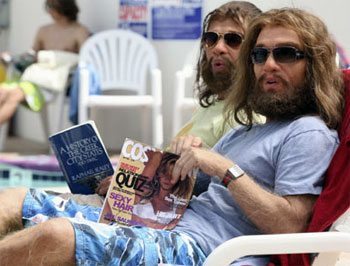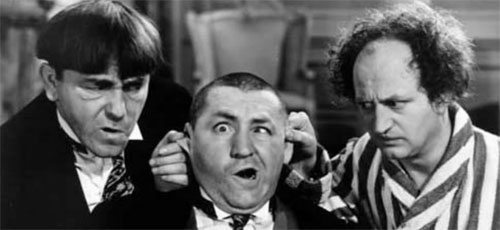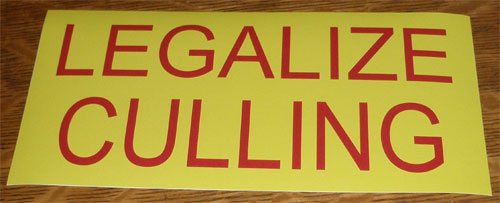If you don’t live in Wisconsin, you may not know that Madison is a huge Democrat town. Or so I’ve been told, since I don’t live there either. Not commenting on D vs. R, just putting into context the recent Republican sweep of the state governorship, assembly and senate, and how that might affect the neanderthal no-culling regs in the state.
Since I don’t live there, I asked a couple folks to opine on the subject of “why are we even talking about cull/no cull in 2000-freakin’-11?” Here’s what I got back, edited. They are not putting their names to their comments because they live in WI. If you have an issue with that, tough nuggets. Here goes:
The Start
How does something this stupid get started?
I stumbled across a paper (pdf) written by Larry A. Nelson, an academic who had taken a leave of absence to work for the Wisconsin Department of Natural Resources in 1984-1985.
In the paper Larry talks about “protectorism, a public management philosophy that sees people as evil-doers, destined to destroy – consciously or unconsciously – a vulnerable aquatic resource and the time-honored methods of fishing.” He adds, “The tragic flaw in protectorism is the ease with which it becomes dogmatic. Protectorists expect trouble until its absence is proven….”
Sound familiar?
That timeframe is when the tournament battle began, and anglers won one big victory in that go-round – tournaments were recognized as a legal and legitimate activity that needed to be regulated. It might sound strange that being regulated by a state agency is a victory, but it’s not if you view it in the context of what was going one in Wisconsin at the time.
In the early ’80s the lake associations in Wisconsin started to gain a lot of power. They started along two paths that if followed would have led to substantial roadblocks to lake use by both rec and tournament anglers.
The first of these was the ramp-purchase strategy. Lake association members pooled their funds and bought up all of the launches on “their” lakes and closed them to anyone not a lake association member.
A second ramp tactic was a fee difference that allowed locals to use “their†lake ramps by paying a small fee while non-local outsider types paid a substantially higher rate.
The legislature was forced to get involved and required the Wisconsin DNR (WDNR) to prepare and implement a plan to assure adequate, equitable launching capacities at all lakes based on the size of the lake.
The second strategy pushed by the lake associations was to push local governments to pass laws prohibiting tournaments from using ramps and parks for weigh-ins or meetings. That is where the being recognized and regulated became important – so local entities could not prohibit a legal state recognized activity.
In both cases the WDNR was forced to do things that they’d avoided, and this came hot on the heels of the WDNR being forced to allow the use of an electric motor to position a boat while casting: Wisconsin anglers were being cited for trolling while using an electric motor to position a boat! The legislature interceded in that case as well.
Needless to say there was not a rosy relationship between the WDNR and the tournament anglers who had to keep going over the agency’s head.
The WNRB: Fish/Hunt Not Required
Another important factor is the Wisconsin Natural Resource Board (WNRB) which sits between the Legislature and the WDNR. The WNRB is made up of appointees that are not required to have any expertise other than knowing the right people. No natural resource experience is required to be on the 7-person board and at times there is not a member of the board that possesses either a fishing or hunting license.
The legislature may require the WDNR to change rules or take action to create rules, but after the process is complete the WNRB has final say over what goes back up to the legislature for review and approval or request for changes. Won’t go into the whole thing, but for all intents and purposes the WNRB and the WDNR can slow or prevent any change to Wisconsin’s natural resource laws and rules.
The WNRB pretty much summed up their position in the Wisconsin administrative code when they stated that “sport fishing should remain a true amateur sport which combines the pleasures and skills of angling with wildlife and scenic enjoyment, contemplation, and other subtle pleasures, not with competition.â€
Against that background, the fight for culling moves forward with a few restrictions. No action has ever been taken to move culling forward by a Democrat-controlled legislature. The WDNR controls the press and information flow and is adept at making a case for studies even if they duplicate existing studies in other states. Many of those studies are conducted by University of Wisconsin Stevens Point, which is a major recruitment site for employment at the WDNR.
When completed the studies are presented in their entirety but with a WDNR summery which color the results as needed. As long as the WDNR can keep presenting “valid†study topics, they can prevent culling from moving forward 2 years at a time.
Quid-Pro-No
During the push to legalize culling in the late ’90s, the WDNR was adamant about not allowing it because neither Iowa nor Minnesota allowed culling and it was not the WDNR’s place to dictate rules to border states with which they had had a long and peaceful coexistence. Somehow the no-cull agreement with them was put on hold while the 2005-2007 bass research study was conducted with very little notice, only to reappear when the studies where done.
What is even more alarming is that when the Iowa and Minnesota Departments of natural resources changed their rules to allow culling, the Wisconsin DNR held fast on its no cull rule and dictated no-cull rules to the border states with which they had such a long and peaceful coexistence.
Maybe?
Now in 2011 Wisconsin has Republican dominance in Madison which will hopefully lead to positive steps on culling. State and local economies are big factors this year, and the economic impact of tournaments have been documented by the WDNR’s own study. It remains to be seen if that will be enough.
My guess is that the WNDR will play the “it’s not fair that bass anglers get to sort and cull fish while others don’t†card. We’ll see if the “we also get to keep them all but don’t card” makes enough of a difference for the protectorists.




























old fishing guy
March 8, 2011 at 8:58 am
Wow the Caveman and Stooges all in one post!!!!!
Makes me proud to be from Wisconsin.
Ronald J. Lindner
March 8, 2011 at 8:59 am
What you obviously don’t understand is what I call a Wisconsin “mind set”. You have a “no culling” rule but you can spear sturgeon. (even if your not an indian) You can use multiple lines (per person) but you cannot troll in some counties. Interestingly using two rods is ok, except when your boardering some Minnesota waters. For years they allowed you to take small muskies, (30 inchers) while states like had high Minimum limits (and thus some of the biggest muskies in the world) and still like to feature themselves the musky capital of the world. What we call “the don’t ask, don’t tell” culling rule, has been in effect and because of the political climate, (forget any biological reason) probably won’t go away. When I was publisher of In-Fisherman magazine and had some strong sway on tourism we tried to get them to change the trolling rule…as they say in New York, “forget about it”. Good luck, I hope your campaign works!
Ronald J. Lindner
March 8, 2011 at 9:04 am
Sorry about the disjointed sentences. I hit the reply button too fast before corrections….What I meant to say that there are states like Minnesota, and provinces like Ontario that have big minimum size limits.
Buzz
March 8, 2011 at 10:56 am
I always assumed the no-cull was an outcome from the practice of using stringers and multiple lines. That the DNR was trying to prevent folks from dragging a fish around all day on a stringer and then high-grading to a larger fish. And that by using multiple lines, hook mortality was increased and smaller fish were being mangled and tossed back; due to high-grading (keeping a bigger one then you had). But with the advent of bass and other fishing boats having very good livewells, the old laws don’t seem to have recognized the improvements. Aren’t there studies on livewell fish, that actually show the benefit from them, that they actually act as life-support tanks?
Maybe Bass Parade can use it’s powers for good; and post some information about livewells and how they help. I’m not sure where they will find funny pictures to complement the information, but I’m looking forward to what they might come up with.
admin (mostly Jay)
March 8, 2011 at 12:46 pm
Here’s one!
old fishing guy
March 8, 2011 at 1:33 pm
As part of the rewrite of tournament rules done in Wisconsin back in 2007 there is a requirment for a airated working livewell in every boat in a permited tournament.
Wisconsin has studied and studied this thing to death. Even when studies had already been done the WDNR push to do thier own studies.
Tumblebug
March 8, 2011 at 4:14 pm
Bass and FLW keep extensive records on survival rates of their tournaments.
Beckie Joki
March 12, 2011 at 10:55 pm
The no-cull did come out of the days of stringers and such… out of the days when fish mortality was not understood as it is today.
Sadly, studies on the improvements to livewells, etc. were brought to “the powers that be”, and they continue to be brought. Studies done by even neighboring states have, until now, been highly ignored. We hope that, since the political winds have shifted, if you will, we will be heard now, and we can be allowed our culling as most other states are.
I believe that most tournament anglers are better stewards of our fisheries than most other stakeholders, and I hope that we can be seen as such in the near future.
I will be in contact with Representative Kleefisch, the author of the proposal to do away with the culling ban, next week, and I’m very interested in how we can all help him get this passed!
Dwain
March 8, 2011 at 4:37 pm
Until the anglers find a way to hit them in the pocket book it sounds like its not going to change.
Dave L.
March 8, 2011 at 9:43 pm
Its unfortunately only a matter of time before the anti-tourney guys and the anti-culling guys get their way…We’ve seen this ‘glimmer’ of hope before…before it was squashed.
Now they’ve reduced bag limits because of the unbelieveable heat in Wisconsin. You know it gets to be 85 degrees once or twice a summer…:)…how do all those bass survive in Texas, Mexico and Florida….The studies have al proven that culling does not harm the bass population… lets hope the WDNR comes to its ‘real’ scientific senses, and allows culling, but I won’t hold my breath on this one.
Beckie Joki
March 12, 2011 at 10:59 pm
All I can say is that, of course, they are not going to change the status quo… unless tournament anglers stand up for themselves. We have to bring a strong voice, but one that is based in fact and reason.
Sadly, when I brought up the subject to my local bass club, the sentiment was the same as you have said, “Don’t hold your breath”… but at the same time, those individuals wouldn’t even take the time to write an email to their state representatives to express their opinion.
I think we can win this…. but we have to try. If we don’t even try, then shame on us, as WI tournament anglers.
Deven Etnyre
March 15, 2011 at 8:29 am
I find it interesting that with more and more bass tournaments we still see an increase in bass size and population. Tournaments lead to more catch and release minded anglers.